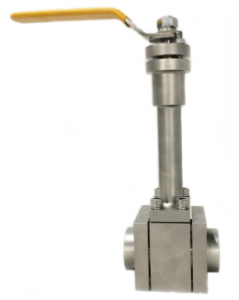UAE valve is the largest Cryogenic ball valve supplier in UAE, and One kind of valve that is intended to function in extremely low temperatures typically below -40°C is the cryogenic ball valve. In the aerospace, medical research, and liquefied natural gas processing industries, cryogenic ball valves are frequently utilized.
The central hole in a ball-shaped stopper that permits fluid flow is the primary component of a cryogenic ball valve. A lever or actuator rotates the ball to regulate the fluid’s flow. Even in extreme cryogenic settings, the valve is made to ensure dependable functioning and avoid leakage. High-performance alloys or stainless steel, two materials that can tolerate low temperatures, are frequently used to make cryogenic ball valves.
Additionally, they are frequently made with extended stems to make it simpler to operate when donning bulky, warm gloves. Cryogenic ball valves are indispensable in numerous industrial applications where accurate and dependable flow control is necessary in extremely low temperatures.
Advantages:
•High flow capacity: The full-bore design of cryogenic ball valves means that the valve bore and ball opening are the same size. High flow rates and little pressure drop are made possible by this.
•Tight shut-off: while closing the cryogenic ball valve, its tight shut-off feature makes sure that no fluid escapes through the valve. This is important in sectors where drips can be costly and dangerous, such as the processing of liquefied natural gas.
•Low maintenance: Cryogenic ball valves need little sustaining and can function dependably for extended periods. This is crucial in situations where it could be challenging to reach valves for repair.
•Broad temperature range: Cryogenic ball valves can function in a broad range of temperatures, from room temperature to very low temperatures. and atmospheric to very low temperatures, making them resourceful in a variety of applications.
•Corrosion-resistant: Cryogenic ball valves are often made of materials such as stainless steel or high-performance alloys, which are corrosion-resistant and can withstand harsh environments.
Industries:
•LNG Processing Industry
•Chemical Processing Industry
•Medical Research
•Aerospace
•Energy
Description:
Available materials: Cast iron, WCB, WCC, WC6, LCC, LCB, Titanium, SS304, SS316, CF8, CF8M , F55, F51, F53, Monel, Ductile Iron.
Available Size: ½” to 48”
Class: 150 to 2500
Nominal Pressure: PN10 to PN450
Ends: Flanged, Threaded, Buttweld, Socket weld
Operations: Lever Operated, Electric Actuated, and Pneumatic Actuated.
Showing the single result



